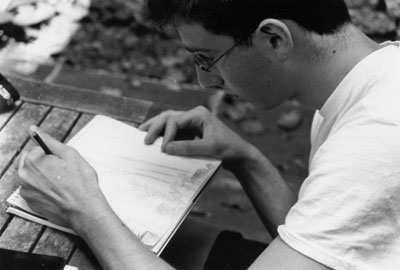All Nonfiction
- Bullying
- Books
- Academic
- Author Interviews
- Celebrity interviews
- College Articles
- College Essays
- Educator of the Year
- Heroes
- Interviews
- Memoir
- Personal Experience
- Sports
- Travel & Culture
All Opinions
- Bullying
- Current Events / Politics
- Discrimination
- Drugs / Alcohol / Smoking
- Entertainment / Celebrities
- Environment
- Love / Relationships
- Movies / Music / TV
- Pop Culture / Trends
- School / College
- Social Issues / Civics
- Spirituality / Religion
- Sports / Hobbies
All Hot Topics
- Bullying
- Community Service
- Environment
- Health
- Letters to the Editor
- Pride & Prejudice
- What Matters
- Back
Summer Guide
- Program Links
- Program Reviews
- Back
College Guide
- College Links
- College Reviews
- College Essays
- College Articles
- Back
The Process
A memory—I sit at the piano, hoping that rote repetition will drill the piece I work on into my hands. After plowing past a particular passage of chords I have stumbled through for days, I feel vaguely inadequate. The piece is by no means new; weeks of wrestling with it to get it to where it is now, and though I have improved drastically, I doubt it will ever become what I want it to be.
This turned out to be the truth. It never did sound like it was supposed to and, though I told myself I had learned more from this one piece than any other, I inwardly wrote it off as a failure. It was supposed to come easily, naturally, but how many times had I wished I could just skip over or hide the process of actually learning to play it in exchange for a flawless final product? Even I had to admit it: I had become a victim of the simple assumption that the means of getting to an end was something I wanted to bypass. That, whatever the books might say, we all knew the outcome was what really mattered in the end—the process was just an occasionally frustrating byproduct of getting there.
Later, I became acutely aware that this idea was something I brought with me to more areas of my life than a lone piano solo. It was something I often carried along with my backpack to school, where by some unspoken word, effortless A’s were better than hard earned ones; I never once heard my classmates speak with pride about a hard-earned B. It was something I sometimes took with me to sports, where, as a girl who was an average runner at best, my improvement seemed to matter little next to how my final mile time ultimately stacked up. Caught up in the rush to the goals we put in front of ourselves, we don’t always live the way we were meant to—that is to say, in the knowledge that there is nothing like the here and now.
It can be a daunting thing to discover that as my peers and I transition into high school, we are increasingly aware of the future stretching out in front of us. Despite swearing off college worries until junior year, prestigious names loom, glittering, not far off. We are lucky enough to have a well trodden path to success laid out: first good grades, then good resume, then good college acceptance, then good job, one after the other. It’s a pleasant, if predictable progression, one that is hard to argue with. And yet, spread out in a dull litany, it doesn’t seem quite as appealing. It also carries an inherent danger. Here, I remember all the tests I have ever studied for without caring whether I remember anything the next day. I remember the poster which used to hang on my history teacher’s wall, the one with the photograph of Booker T. Washington that proclaimed, I have learned that success is to be measured not so much by the position that one has reached in life as by the obstacles which he has had to overcome while trying to succeed. By choosing to set life up as stepping stone goals, we take life as a race to the finish and risk forgetting that where we end up means little to the journey in arriving there. The vast majority of our life is in the precious growth in between. By learning to train our eyes on the paper grade or the acceptance letter but rushing through the journey there, we only limit ourselves. We limit ourselves, because in a life raced through goals strung one after another, where we measure ourselves by the place we wind up, there is only success and failure. A life taken, instead, as a continuous journey moving upwards and onwards, is a bit like the writing process itself. There is no winning, there is no losing. There is only revision.
A memory—this one, more recent. I hunch over my heavily annotated copy of the Odyssey, scribbling cryptic footnotes as I read on through the Book where, after a prolonged, multi-chapter wait, Odysseus finally vanquishes the suitors. No doubt, Athena could have struck the suitors down with a handful of words, but she refrains. As all-knowing readers, we understand why: the goddess of wisdom knows that it must be Odysseus who does the deed, because the accomplishment is only a fraction of the journey up to it. It can’t stand without it. Athena has it right—and we would do well to remember as we carry on in our lives that after the story ends, the journey is what we will remember.

Similar Articles
JOIN THE DISCUSSION
This article has 0 comments.
